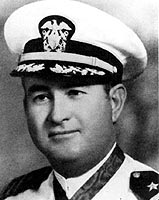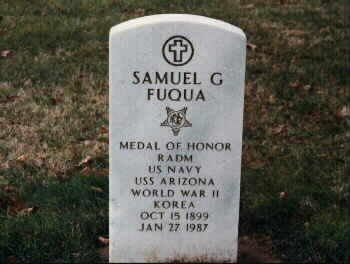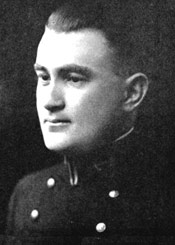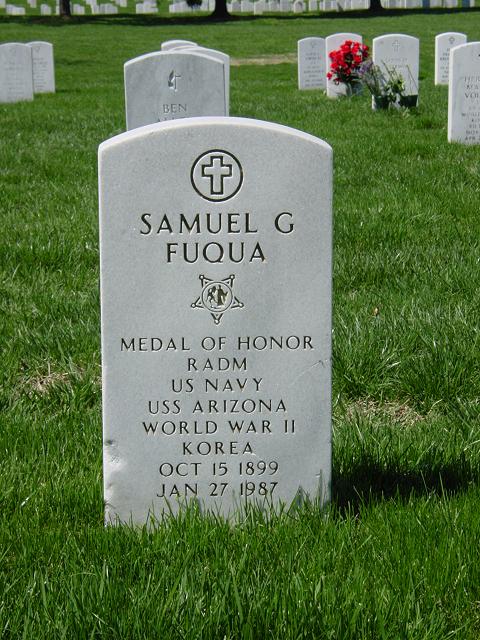Born at Laddonia, Missouri, on October 15, 1899, Samuel Glenn Fuqua (“Sam”) was awarded the Medal of Honor for service as a Captain aboard the USS Arizona at Pearl Harbor, Hawaii, on December 7, 1941 during the Japanese sneak attack which started World War II in the Pacific. He was a 1923 graduate of the United States Naval Academy.
He died on January 27, 1987 and was buried in Section 59 of Arlington National Cemetery.
FUQUA, SAMUEL GLENN
Rank and organization: Captain, U.S. Navy, U.S.S. Arizona. Place and date: Pearl Harbor, Territory of Hawaii, 7 December 1941. Entered service at: Laddonia, Missouri. Born: 15 October 1899, Laddonia Missouri.
Citation
For distinguished conduct in action, outstanding heroism, and utter disregard of his own safety above and beyond the call of duty during the attack on the Fleet in Pearl Harbor, by Japanese forces on 7 December 1941. Upon the commencement of the attack, Lt. Comdr. Fuqua rushed to the quarterdeck of the U.S.S. Arizona to which he was attached where he was stunned and knocked down by the explosion of a large bomb which hit the guarterdeck, penetrated several decks, and started a severe fire. Upon regaining consciousness, he began to direct the fighting of the fire and the rescue of wounded and injured personnel. Almost immediately there was a tremendous explosion forward, which made the ship appear to rise out of the water, shudder, and settle down by the bow rapidly. The whole forward part of the ship was enveloped in flames which were spreading rapidly, and wounded and burned men were pouring out of the ship to the quarterdeck. Despite these conditions, his harrowing experience, and severe enemy bombing and strafing, at the time, Lt. Comdr. Fuqua continued to direct the fighting of fires in order to check them while the wounded and burned could be taken from the ship and supervised the rescue of these men in such an amazingly calm and cool manner and with such excellent judgment that it inspired everyone who saw him and undoubtedly resulted in the saving of many lives. After realizing the ship could not be saved and that he was the senior surviving officer aboard, he directed it to be abandoned, but continued to remain on the quarterdeck and directed abandoning ship and rescue of personnel until satisfied that all personnel that could be had been saved, after which he left his ship with the boatload. The conduct of Lt. Comdr. Fuqua was not only in keeping with the highest traditions of the naval service but characterizes him as an outstanding leader of men.
Fuqua received his Medal of Honor in March 1942. Ironically, his first tour was on Arizona, where he served from 1923-24. Seventeen years later, on 7 December he had rushed to the quarterdeck after hearing an air raid siren.
He told a congressional committee that he told the officer of the deck to sound general quarters and to set “material condition ZED as final damage control condition for battle.” He continued:
“About this time I heard a plane overhead. I glanced up. I saw a bomb dropping, which appeared to me was going to land on me or close by. The next thing I remember I came-to on deck in a position about six feet aft the starboard gangway. I got to my feet and looked around to see what it was that had knocked me down. Then I saw I was lying about six feet from a bomb hole in the deck. This bomb had hit the face plate of No. 4 (the aft-most) turret, had glanced off that and gone through the deck and had exploded in the captain’s pantry. Then I glanced up forward and saw the whole midship a mass of flames in that section of the ship.”
After he regained consciousness, he directed rescue and firefighting. Arizona then received her deathblow: a bomb hitting the forward part of the ship. Despite that explosion and enemy bombing and strafing, he continued directing rescue and firefighting.
Realizing that Arizona was doomed and that he was senior surviving officer, he gave the order to abandon ship.
His Medal of Honor citation notes that his performance of duty was “in such an amazingly calm and cool manner and with such excellent judgment that it inspired everyone who saw him and undoubtedly resulted in the saving of many lives.” His conduct certainly drew the attention of Arizona’s enlisted men.
E.C. Nightingale, a Marine Corporal, saw Fuqua on deck and wrote that he seemed “exceptionally calm.” He added, “Charred bodies were everywhere.”
D.A. Graham, a First Class Petty Officer, wrote: “Mr. Fuqua was the senior officer on deck and set an example for the men by being unperturbed, calm, cool, and collected, exemplifying the courage and traditions of an officer under fire. It seemed like the men painfully burned, shocked, and dazed, became inspired and took things in stride, seeing Mr. Fuqua, so unconcerned about the bombing and strafing, standing on the quarterdeck. There was no “going to pieces” or “growing panicky” noticeable, and he directed the moving of the wounded and burned men who were on the quarterdeck to the motor launches and boats.”
His conduct proved the truth of this Lucky Bag observation about his ability to look after his shipmates:
“Ben in normalcy has the Sphinx snowed under, but once in a while we get wise to him. Ask “Jenny” or any of the boys about the night before the Penn State game in Philly and they will tell you how he brought them all back to the hotel safe and sound.”
In 1942, he was assigned to the cruiser Tuscaloosa (CA-37), which escorted Murmansk convoys and was in the Battle of Casablanca. He was later assigned to Navy Operating Base, Guantanamo, Cuba; to Naval War College; and finally to the staff of Commander Service Force Seventh Fleet in the Southwest Pacific, where he earned a Legion of Merit as the force operations officer.
Upon retirement in 1953 he was promoted to Rear Admiral by a “tombstone” promotion that advanced officers below admiral one permanent grade upon retirement if they had been specifically commended for performance in combat.
Fuqua, who served in the Army in World War I, died in 1987 and was buried in Arlington National Cemetery.


Michael Robert Patterson was born in Arlington and is the son of a former officer of the US Army. So it was no wonder that sooner or later his interests drew him to American history and especially to American military history. Many of his articles can be found on renowned portals like the New York Times, Washingtonpost or Wikipedia.
Reviewed by: Michael Howard


